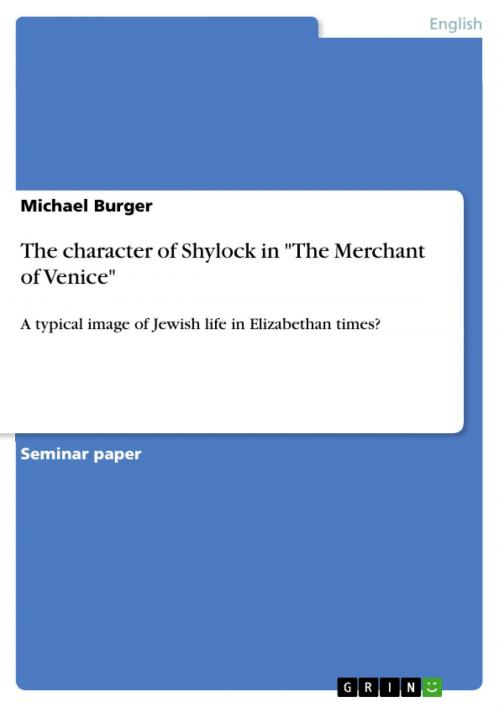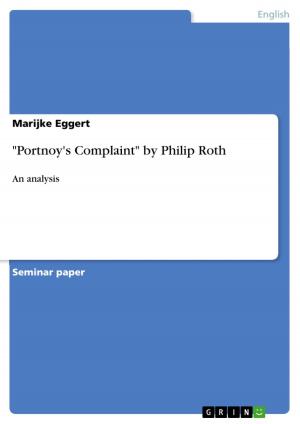The character of Shylock in 'The Merchant of Venice'
A typical image of Jewish life in Elizabethan times?
Fiction & Literature, Literary Theory & Criticism, British| Author: | Michael Burger | ISBN: | 9783638048873 |
| Publisher: | GRIN Publishing | Publication: | May 15, 2008 |
| Imprint: | GRIN Publishing | Language: | English |
| Author: | Michael Burger |
| ISBN: | 9783638048873 |
| Publisher: | GRIN Publishing |
| Publication: | May 15, 2008 |
| Imprint: | GRIN Publishing |
| Language: | English |
Seminar paper from the year 2007 in the subject English Language and Literature Studies - Literature, grade: 2,0, University of Augsburg, course: Proseminar, 9 entries in the bibliography, language: English, abstract: William Shakespeare's The Merchant of Venice surely can be considered one of the playwright's greatest works. Still today critics are not fully aware of its actual meaning and there are many different opinions of how this play is to be interpreted. As a matter of fact we can say that Shakespeare has created one of the most diverse plays in the history of drama. Containing two equally important plot-lines and several sub-plots it is very difficult to make out even one main character or to be absolutely sure about their variety of intentions. On the one hand there is one of the main characters, the Jew Shylock, 'a comic antagonist far more important than any such figure had been in his [Shakespeare's] earlier comedies' , who plays the role of a non-Christian villain. And opposing him we have the Venetian society with all its flaws and hypocrisies which are pointed out during the conflict with Shylock. On the other hand there is the romantic love story between Portia and Bassanio located in remote Belmont, which is the actual trigger for the conflict between Antonio and Shylock and also brings a solution to it. This solution is due to Portia's cunning and liberation as a woman, which can be seen in her disguising as the judge in order to be able to save Antonio's life; there are only two qualities which are supposed to be quite unusual for a female character of that time. But at the same time she has to fulfil her typical role as 'a faithful daughter whatever the consequence' , yielding to fate by obeying her father's will. And Portia is not the only ambigous and exceptional figure of the play.
Seminar paper from the year 2007 in the subject English Language and Literature Studies - Literature, grade: 2,0, University of Augsburg, course: Proseminar, 9 entries in the bibliography, language: English, abstract: William Shakespeare's The Merchant of Venice surely can be considered one of the playwright's greatest works. Still today critics are not fully aware of its actual meaning and there are many different opinions of how this play is to be interpreted. As a matter of fact we can say that Shakespeare has created one of the most diverse plays in the history of drama. Containing two equally important plot-lines and several sub-plots it is very difficult to make out even one main character or to be absolutely sure about their variety of intentions. On the one hand there is one of the main characters, the Jew Shylock, 'a comic antagonist far more important than any such figure had been in his [Shakespeare's] earlier comedies' , who plays the role of a non-Christian villain. And opposing him we have the Venetian society with all its flaws and hypocrisies which are pointed out during the conflict with Shylock. On the other hand there is the romantic love story between Portia and Bassanio located in remote Belmont, which is the actual trigger for the conflict between Antonio and Shylock and also brings a solution to it. This solution is due to Portia's cunning and liberation as a woman, which can be seen in her disguising as the judge in order to be able to save Antonio's life; there are only two qualities which are supposed to be quite unusual for a female character of that time. But at the same time she has to fulfil her typical role as 'a faithful daughter whatever the consequence' , yielding to fate by obeying her father's will. And Portia is not the only ambigous and exceptional figure of the play.















